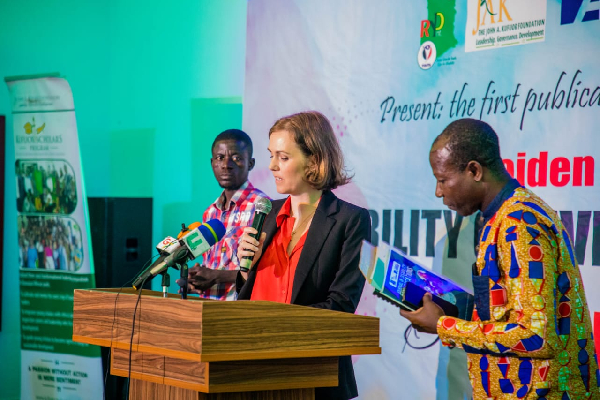The maiden edition of the Journal of Disability Conversations was officially launched at the University of Professional Studies, Accra (UPSA), marking a significant milestone in disability advocacy, research, and documentation in Ghana.
The event, held at the university’s main auditorium, brought together key stakeholders from academia, government, civil society, and the disability community.
The Journal is a joint initiative spearheaded by Dr James Kwabena Bomfeh Jnr, Executive Director of the Rights of Youth and Disability (RYD), in collaboration with the JAK Foundation and the Konrad Adenauer Stiftung (KAS).
In his keynote remarks, Dr Bomfeh emphasized that disability is a relative and dynamic condition that can affect anyone.
He stated, “Every human being is, at one point or another, competitively, functionally, mentally, temporarily, or permanently disabled. Disability, as a social construct, becomes a problem when society fails to provide support, access, and inclusion to affected individuals.”
The event’s chairman, Professor John K Mensah Mawutor, Vice-Chancellor of UPSA, applauded Dr Bomfeh’s resilience and dedication to the cause.
He pledged to establish a Centre for Disability Affairs at UPSA, affirming that inclusivity is a shared responsibility across all sectors — from homes and schools to corporate and governmental institutions.
Country Director of Konrad Adenauer Stiftung, Anna Wasserfall, in her address, stressed that “disability inclusion is not a privilege or act of charity, but a matter of human rights and justice.”
She cited the provision of Braille typewriters to the editorial team as a critical example of inclusive planning.
“Launching a disability journal without Braille copies would have been a violation of the rights of persons with visual impairments,” she added.
Kwasi Subi, a retired educationist from Wesley College of Education who reviewed the Journal, reflected on the philosophical nature of disability.
Drawing from the ancient Greek Sphinx riddle, he illustrated that all humans transition through stages of ability and disability, emphasizing that disability is an inherent part of the human condition.
The journal was formally launched by its Chief Editor and Executive Director of the JAK Foundation, Professor Bafour Agyeman-Duah.
He commended Dr. Bonfeh for his passion and tireless efforts, crediting the success of the publication to his leadership.
“My task as Chief Editor was made significantly easier due to the diligent work of the Managing Editor and the entire editorial team,” he noted.
Speaking on behalf of former President John Agyekum Kufuor, Dr Kwabena Osei-Adubofour, his spokesperson, conveyed the former president’s appreciation for the invitation.
He praised Dr Bomfeh’s work, stating that the Journal stands as a testament to his unwavering advocacy for disability rights.
Dr Osei-Adubofour recalled President Kufuor’s introduction of the Persons with Disability Act, 2006 (Act 715), and lamented its poor implementation.
He called for stricter enforcement of both local and international disability rights legislation.
Several dignitaries graced the occasion, including Francis Poku, former National Security Minister; OB Amoah, former Minister of State; Dr Henry S Daanaa, Esq, former Minister of State; David Asante-Apeatu, former Inspector General of Police; and Ivor K Greenstreet, Esq, former flagbearer of the Convention People’s Party (CPP).
Audience engagement was robust, with discussions focusing on the need for a broader understanding of disability and stronger enforcement of disability rights. Participants underscored the urgency of dismantling societal stereotypes and misconceptions that render persons with disabilities socially invisible.
In his closing remarks, Dean of the faculty of management studies at UPSA, Dr Ernest Abraham, extended gratitude to all attendees, contributors, and partners.
He praised the event as a landmark occasion in the journey toward a more inclusive and equitable society.
The Journal of Disability Conversations now stands as a scholarly and advocacy tool aimed at reshaping narratives, amplifying voices, and celebrating the achievements of persons with disabilities across all sectors of life.


